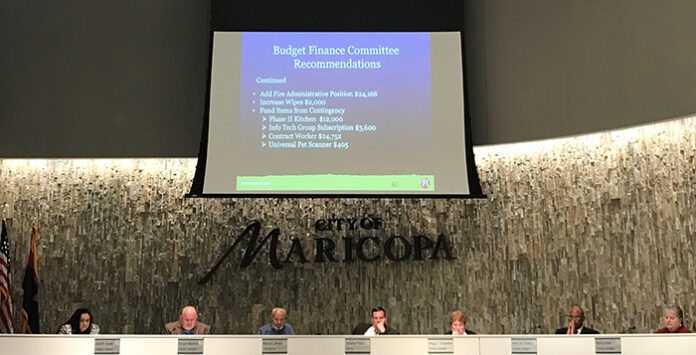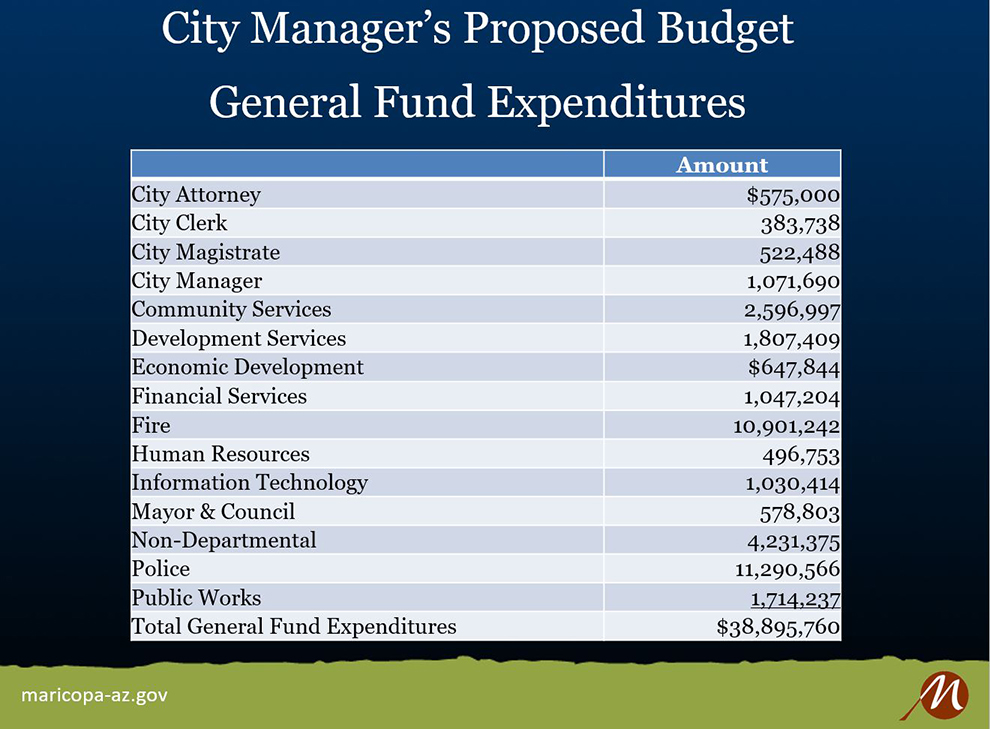In a late-night push the Maricopa City Council passed the first draft of the city’s 2017-18 budget Tuesday, including a decrease in taxes.
After a lengthy presentation by city manager Gregory Rose and an intricate discussion across the dais, council members unanimously approved the “balanced” budget. Among other things, it will lower the secondary property tax rate for Maricopa property owners from $1.69 to $1.40 for $100 of assessed valuation.
City officials deemed the decrease to be possible in light of an increase in home values as well as an increase in home sales.
The tax, designed to cover the construction costs of Copper Sky, will eventually be phased out entirely upon fulfillment of the revenue bond.
Overall, city expenses are estimated to increase from around $31 million to nearly $39 million, with fire, police and the city magistrate receiving around 59 percent of that.
Despite the tax-rate decrease, the city is planning to increase salaries across the board by 4 percent.
They are also seeking to purchase new emergency-response and technological equipment. The city wants to add multiple personnel including a police lieutenant and dispatcher, two fire captains and a fire administrative assistant, two code inspector positions and an information technologies support technician.
The spending will also pay for a new fire department administration building at the Estrella Gin site.
To pay for these additional items and positions, city officials hope to not only see increased revenue from the adjusted tax plan but also increased income from Copper Sky, various grants and an annual transfer of $500,000 in Highway User Revenue Funds (HURF) to the General Fund.
Over the course of 12 years, $6 million will be transferred from HURF coffers to the General Fund to cover costs associated with the State Route 347 overpass construction.
The only real point of contention came down to a proposed $14,000 in funding for two of the city’s newest committees – the Veterans Affairs Committee and the Cultural Affairs Committee.
Councilmember’s all seemed to agree the city should be able to offer help to the committees but not have to fund them in their entirety. Neither was formed by statute such as the Board of Adjustments, or Planning and Zoning Commission.
Mayor Christian Price said he wanted to offer financial assistance to the committees in some way, but “$7,000 is too much.”
He said $4,000 or $5,000 is more acceptable, though even that should not be a blind expense.
“[The money’s] there, it’s on the side, but it’s not a mandate to spend it,” Price said.
Councilmember Peg Chapados agreed with Price, going a step further and suggesting the creation of a general fund to which all boards, commissions and committees could apply to for funding.
“I think we have to incentivize our committees to be able to do things for the community,” Chapados said. “But we also have to look at sponsorship as a realistic funding mechanism.”
In the end, council decided to create a general BCC fund of $25,000, which will be accessible to all boards, commissions and committees. Council hopes to further whittle that amount down to $20,000, choosing to allocate the larger amount as a protective measure as the budgeted amount can always decrease but not increase.
Upon approving the budget, City Manager Gregory Rose thanked city staff’s efforts to bring a balanced budget to the table and offered special recognition to Financial Services Director Brenda Hasler for her team’s long hours.
Council concurred the sentiment, offering extended applause.
Though most of this new budget will remain intact, expenditures may be reduced or have their cost burden shifted as the city sees fit and as is allowable by law.
Click on photos below






![Shred-A-Thon to take place tomorrow An image of shredded paper. [Pixabay]](https://www.inmaricopa.com/wp-content/uploads/2024/03/shredded-paper-168650_1280-218x150.jpg)












![Shred-A-Thon to take place tomorrow An image of shredded paper. [Pixabay]](https://www.inmaricopa.com/wp-content/uploads/2024/03/shredded-paper-168650_1280-100x70.jpg)
